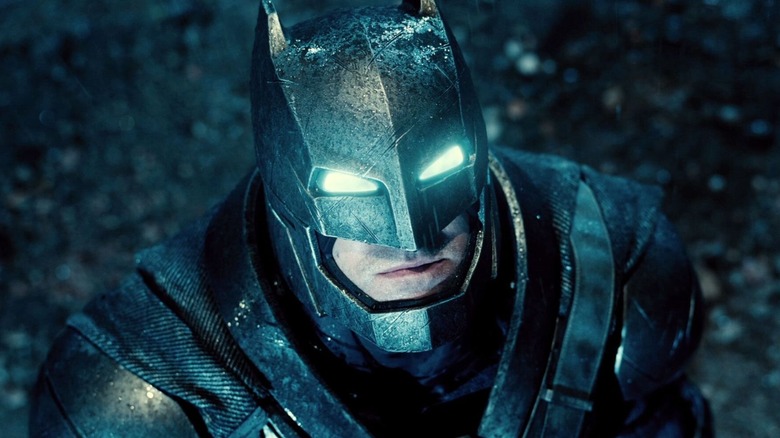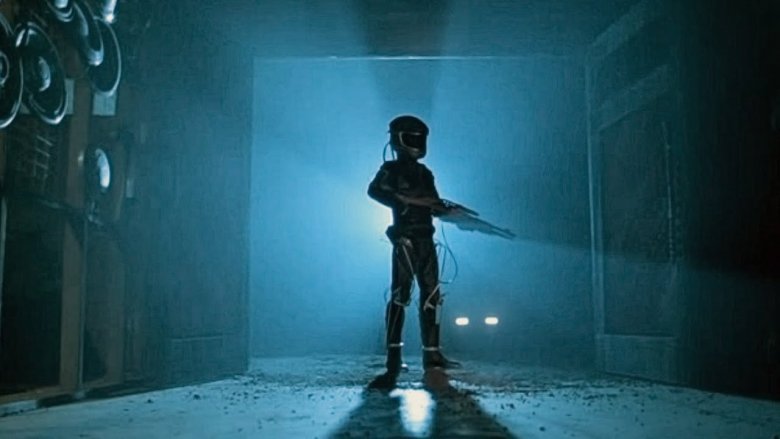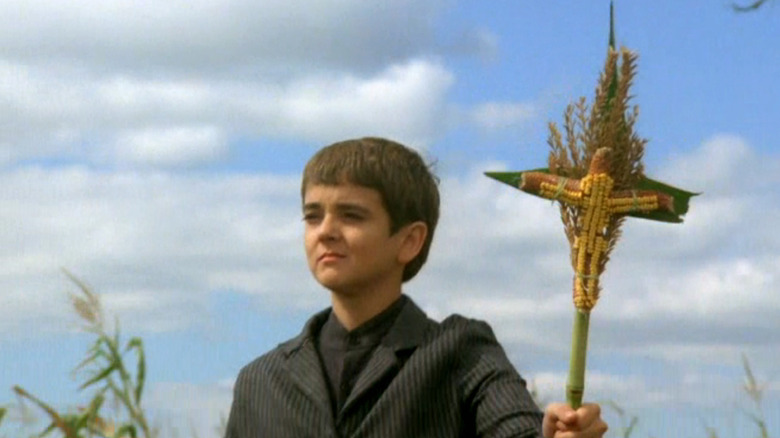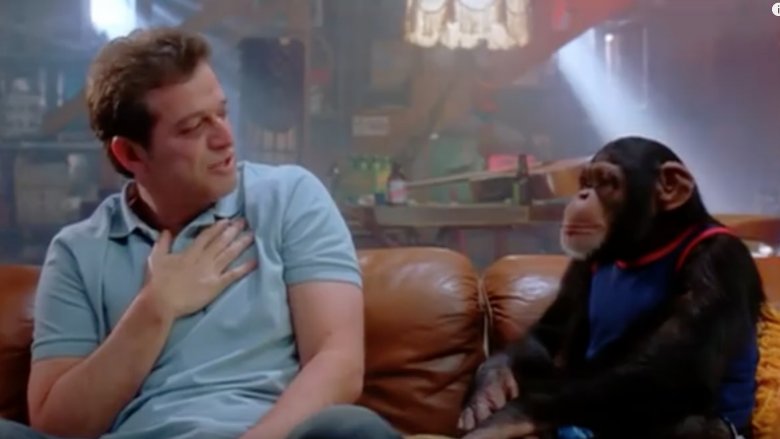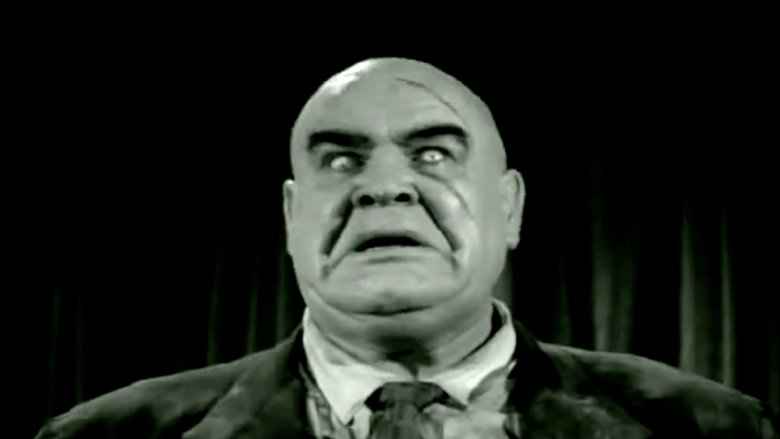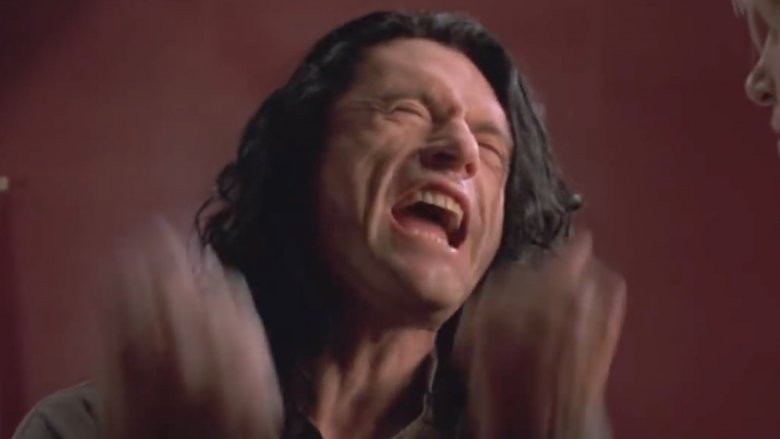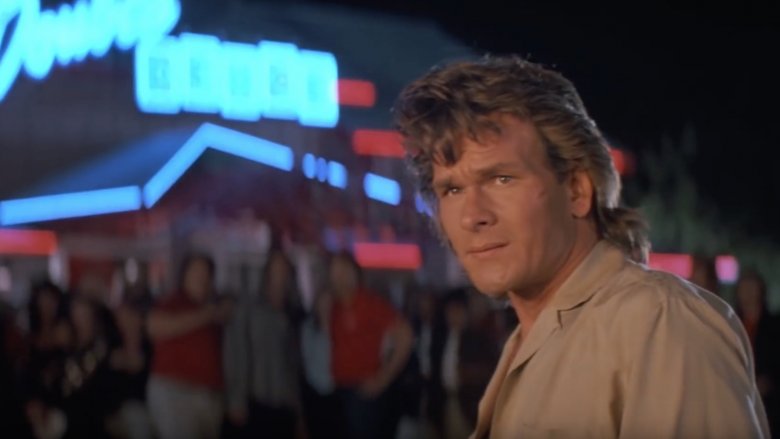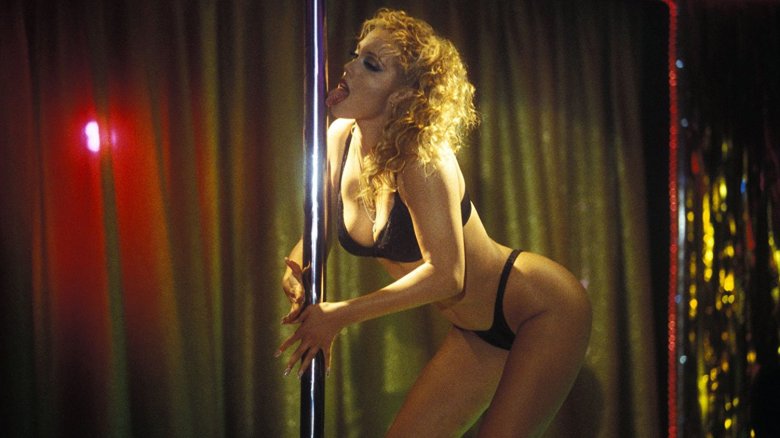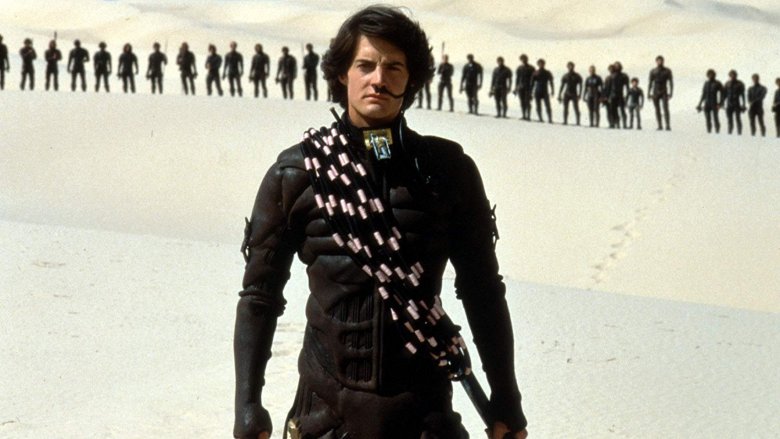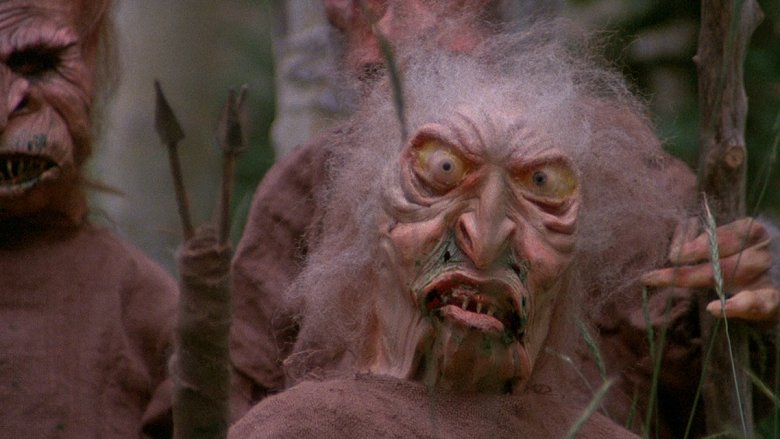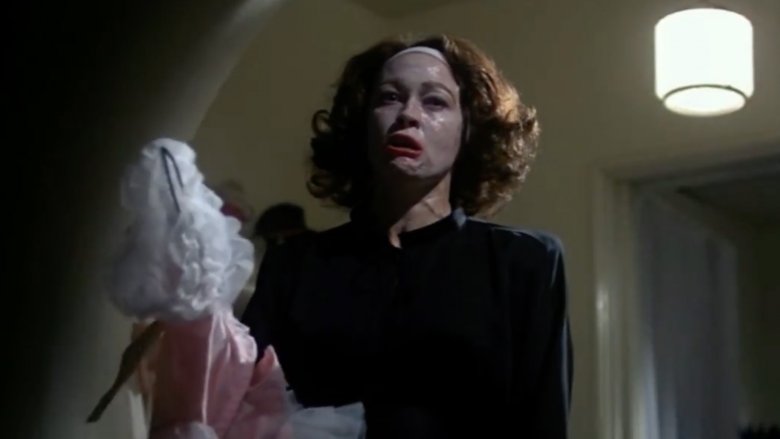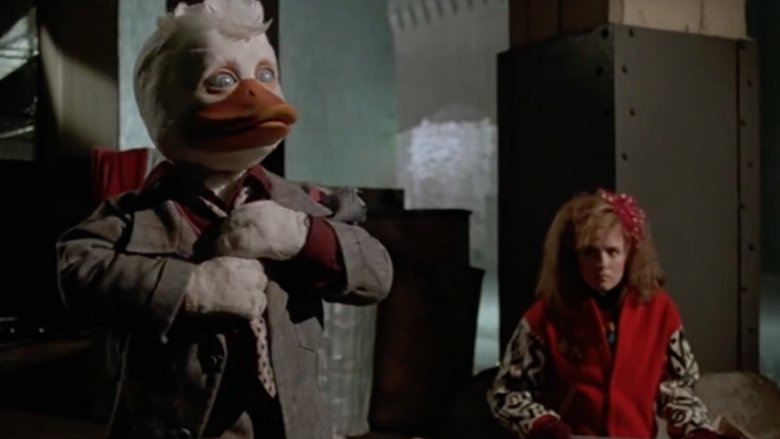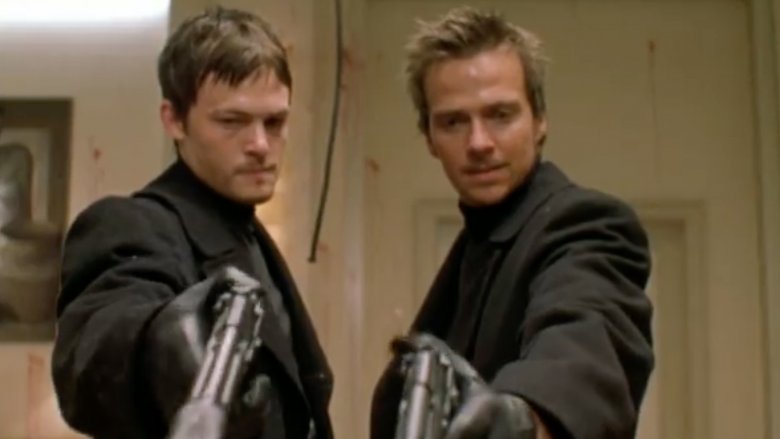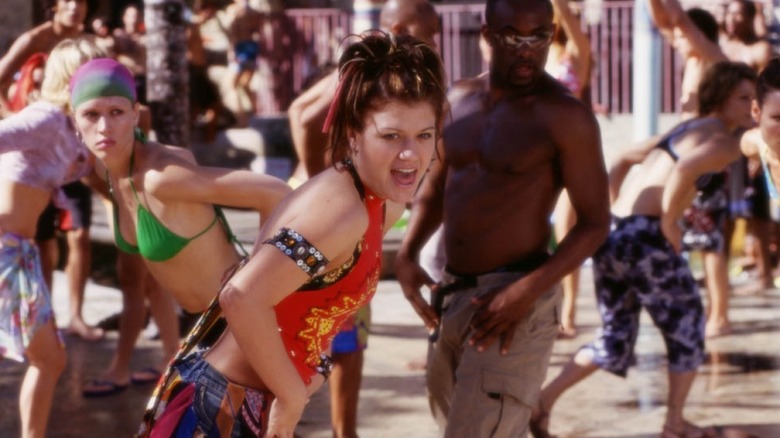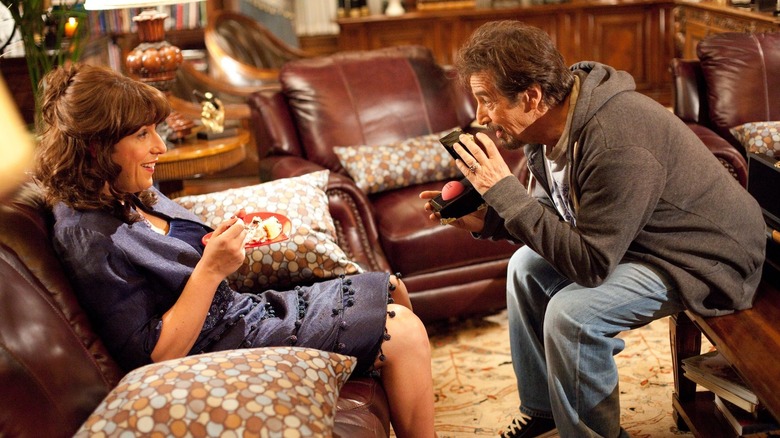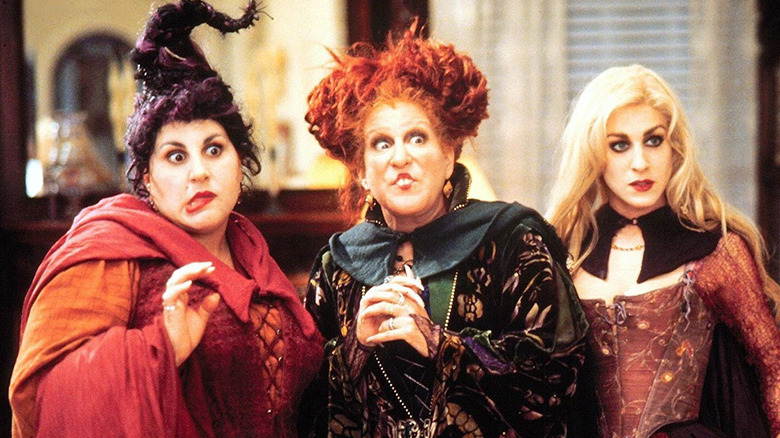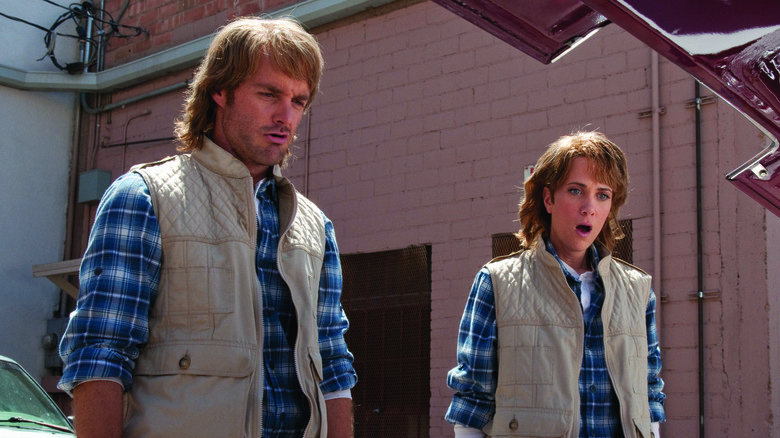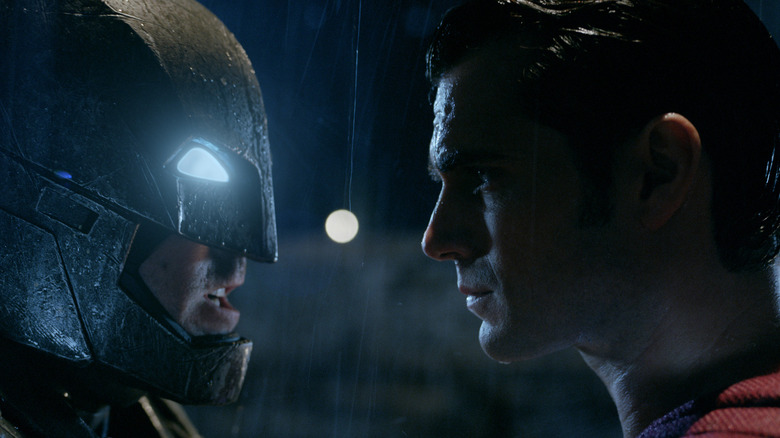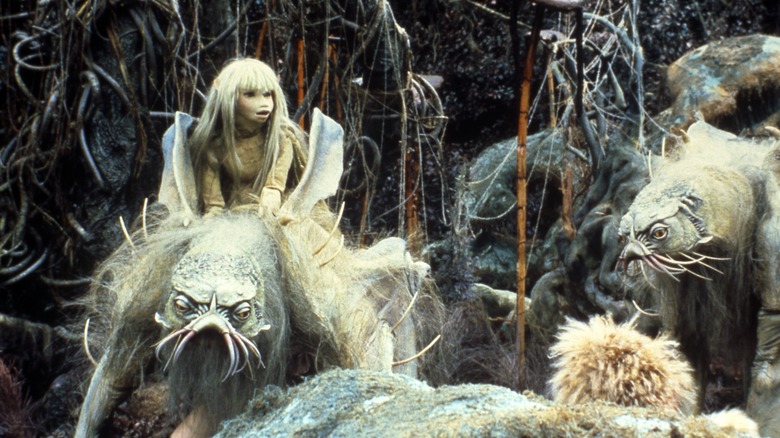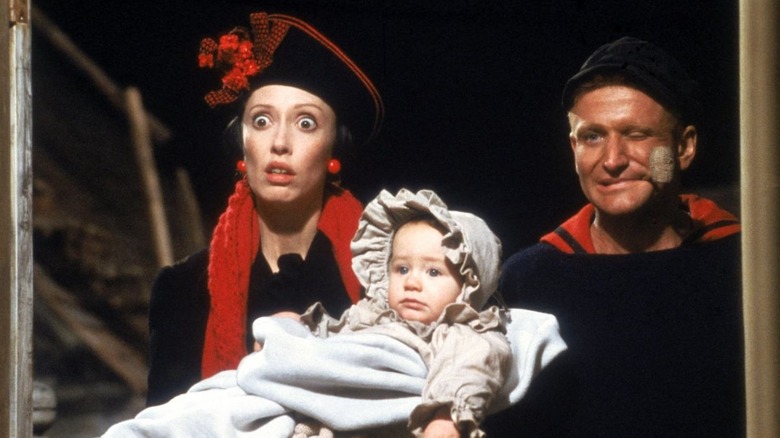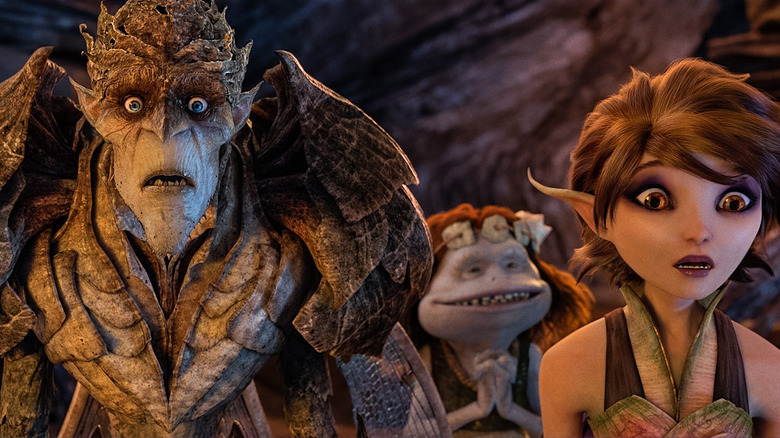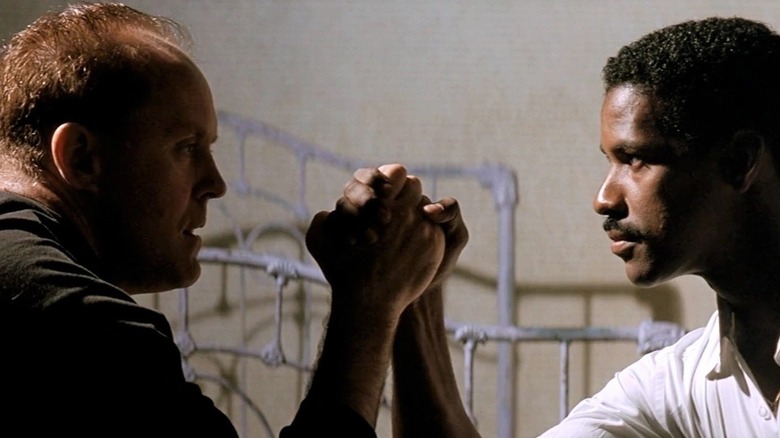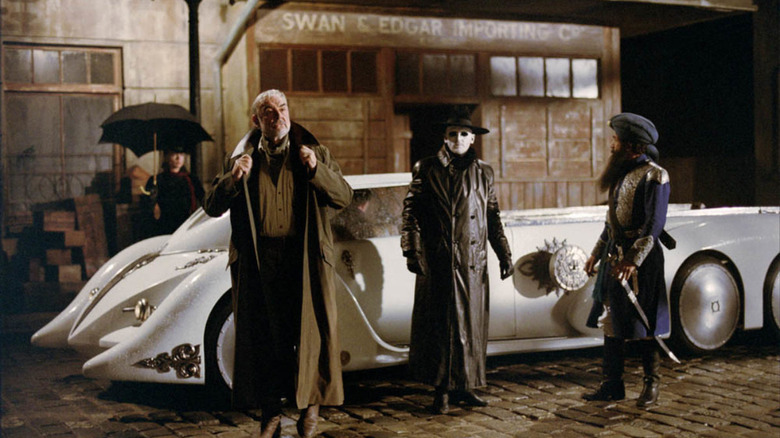Cult Classics That Are Actually Really Bad Films
The term "cult classic" gets tossed around a lot these days. Maybe a little too much. It seems like every time a less-than-traditional little film — or less-than-spectacular tentpole — doesn't make a bundle in its theatrical release, it's suddenly being called a "future cult classic." Those films generally have a tendency to fade into obscurity because they're not very good — which is exactly what's supposed happen to really bad movies.
On occasion, a movie is so poorly made that it finds its way into the "cult classic" conversation by way of the "so bad it's great" loophole. Sometimes critics, looking back into the past through the lens of nostalgia, decide that the movie they blasted a few years ago isn't really that bad, and may secretly be a masterpiece full of hidden meanings. But more often than not, "so bad" just means they're actually terrible films — kind of like the ones on this list.
The Wraith
Like most purveyors of late-night HBO programming, we spent a lot of time watching and re-watching some seriously silly movies over the years. But few of those movies have tickled our fancy quite the way that 1986's Charlie Sheen-starring sci-fi schlock-fest "The Wraith" does.
Make no mistake, even if "The Wraith" has built a passionate following over the years, it's just as awful now as it was upon release. Then again, one could hardly expect magic from a movie centered around a murderous gang of thugs — who spend their days getting wasted on brake fluid and WD-40 — and a malevolent, drag-racing entity out to serve them their due justice.
Packed with ridiculously over-the-top performances from a surprisingly impressive cast of up-and-comers, some cheesy special effects, and bland stereotypical characters, "The Wraith" has somehow claimed a seat at the B-movie classic table. The film is amateurish, even campy, and its self-awareness prevents viewers from taking any element of the story too seriously. All of which would be fine if it didn't feel like everyone involved in "The Wraith" – especially Clint Howard(!) — was giving it their all.
Children of the Corn
For every successful Stephen King adaptation like "Carrie," "It," "The Shining," or "The Shawshank Redemption," there's always a disaster like "Firestarter" or "The Dark Tower" to prove that adapting King's work can still go horribly wrong. For further evidence of that fact, see 1984's King-based catastrophe "Children of the Corn."
Adapted from King's 1977 short story, the film takes place in an isolated Nebraska town and follows a child-led religious cult hellbent on ensuring that the town's corn crop remains robust. Of course, they have to sacrifice all of the adults to make that happen. That last bit bodes poorly for Vicki (Linda Hamilton) and Burt (Peter Horton) when their car breaks down in town.
So what went wrong with "Children of the Corn"? Fans of King's short story would testify that it remains a stone-cold chiller. King even tried to adapt it for the big screen himself, but the author's moody, character-driven screenplay was tossed aside in favor of George Goldsmith's ludicrous, hyper-violent, narratively flimsy take on the tale. No matter what die-hard King fans try to tell you, "Children of the Corn" is all of those things. Even if some of the film's imagery still colors the pop-culture pantheon, it's a stagnant, ugly movie to look at, leading us to question just how this terrible film managed to inspire its own straight-to-video franchise.
Grandma's Boy
There's no accounting for taste when you're talking about cult classics, because taste is so hyper-focused in the cult cinema conversation that it's sort of irrelevant. Still, every once in a while, a film claims cult status that just makes you want to hold people accountable. Case in point: 2006's wanna-be stoner comedy "Grandma's Boy."
Understand that we're using the word "comedy" loosely here, because — save for the yeoman's work of Doris Roberts, Shirley Knight, and Shirley Jones — there's really not much to laugh at in this turgid tale of a 35-year-old slacker forced to move in with his Grandma. Realistically, there are only like four actual jokes in "Grandma's Boy," and the film simply recycles them over and over and over again. At some point, you have to throw your hands up and say, "Okay. We get it, they smoke a lot of pot, play a lot of video games, and that one guy acts like a robot. What else you got?" The answer is a resounding "Nothing." That's just what you'll get out of watching "Grandma's Boy" even once. It's hard to believe that anybody would want to watch it a second time.
Plan 9 From Outer Space
Of all the films on this list, "Plan 9 From Outer Space" is undoubtedly the one made with the most heart. While it's become easy to mock Ed Wood for his skills (or lack thereof) as a filmmaker, it's also impossible to question his passion for the medium. That passion led Wood to put his soul into writing, producing, and directing 1959's "Plan 9 From Outer Space." Unfortunately, his lack of skill regularly lands "Plan 9" near the top of many "worst movies ever made" lists.
Does "Plan 9" really deserve that "worst ever" title? Chock full of absurdly silly dialogue, unintentionally cheesy special effects, and cut together with an amateurish DIY sensibility, Wood's tale of aliens and zombies vs. humanity is the very definition of cinematic lunacy. It absolutely does earn the title of "worst movie ever made."
By the same token, it's almost unfair to cast that stone when you account for the unbridled affection that went into the film's creation. One might even be tempted to claim that "Plan 9 From Outer Space" is the sort of film that redefines the term "so bad it's great," but you'd be wrong. "Plan 9 From Outer Space" is just plain bad, and if you're laughing at it, keep in mind: it's not a comedy.
The Room
Though "Plan 9 from Outer Space" is still widely regarded as the worst film ever, it got some serious competition in 2003 when Tommy Wiseau unleashed "The Room" on the world. If you were to compare these films purely on the basis of their Rotten Tomatoes score, "The Room" may have legit bragging rights to that "worst ever" title. Almost in spite of itself, "The Room" has become a bona fide cult sensation over the years, one that now rivals "The Rocky Horror Picture Show" as king of the midnight screenings.
How did this happen, you ask? We have not a single, solitary clue. Anybody who's seen "The Room" even once can tell you that it's every bit as bad as you've heard. Wiseau's tale of a good man losing it all looks and feels like a no-budget TV show from the 1980s, the dialogue is at times unintelligible and the acting is embarrassingly over the top. To make matters worse, it doesn't look like any of the cast — save for Wiseau — has a clue what's going to happen from one moment to the next. We get it, everyone loves to watch a disaster, but that doesn't mean the disaster deserves to be celebrated and audiences should continue to celebrate this unmitigated travesty of filmmaking.
James Franco took on the narrative behind the creation of "The Room" in 2017's "The Disaster Artist," but we can't help but worry that his film might ultimately encourage people to start taking Wiseau's disasterpiece seriously.
Road House
Don't get all defensive now, we love "Road House" as much as you do — maybe even more. But our unapologetic adoration for this action-packed Patrick Swayze cheese-fest doesn't make it a good movie. It doesn't even make it a good cult movie. So let's all take a deep breath and accept one singular fact: "Road House" is just plain awful.
Shake it out now and let's get back on track, because there's nothing wrong with loving a bad movie. All it means is that you're willing to admit that the plot of "Road House" is beyond stupid, that the acting in the film — save for a terrifically deadpan Sam Elliott performance — is beyond bad, that the film's fight scenes are uninspired, and that Patrick Swayze looks like he spent more time oiling himself up for those copious shirtless scenes than he did thinking about his character.
Not that there was much going on under the surface of famed "cooler" James Dalton — or even the B-movie bombast of the film itself. Still, Swayze brought zero depth to his "Road House" role. Had the late, great actor fully committed to the part, "Road House" might have found its way into the "not a terrible movie" conversation. Sadly, he didn't bring the heat to "Road House," and, no matter how much we love it or how many times we re-watch it, "Road House" remains an epically bad movie.
Showgirls
So you've got a friend who read a book that says Paul Verhoeven's 1995 sexploitation satire "Showgirls" is a misunderstood masterpiece, do ya? Okay, we're happy to acknowledge Verhoeven as one of the great satirists in cinema, but his take on Joe Eszterhas' unwittingly silly "Showgirls" script backfires badly. It ultimately leads the film into the dreaded realm of callous camp. So no matter what your friend read, we're here to tell you that "Showgirls" is simply awful, and no amount of full-frontal nudity or satirical sexual melodrama is going to convince us otherwise.
No need to get all huffy, we've a few irrefutable facts that prove just how bad "Showgirls" is. 1) Kyle Maclachlan is still shocked by just how bad it turned out. In a 2012 interview he admitted to being "gobsmacked" after seeing it and went on to claim, "I said, 'This is horrible. Horrible!" 2) Elizabeth Berkley — a trained dancer in real life – gave up dancing for years after the film's release. 3) There's a scene where characters discuss how they used to love eating dog food, and it's meant as a character-building moment. 4) "Showgirls" basically ended the careers of Berkley and Eszterhas (who was one of Hollywood's hottest scribes at the time).
Although one could argue Verhoeven was brilliant to exploit the script's ridiculous plotting and misguided sense of feminism, its record-setting run at the 1995 Razzie Awards proves our point (whether they got the joke or not): Even knowing it's a comedy, this movie is unbearable.
Dune
There's not a filmmaker on this list with more cult-cred than David Lynch, but even the famed auteur of alternative cinema couldn't "cult" his way into bringing a successful version of Frank Herbert's iconic sci-fi novel "Dune" to the big screen. Lynch's big-budget debut hit theaters in 1984 and was immediately marked as a frustratingly epic misfire by critics. In his one-star review of the film, Roger Ebert stated, "This movie is a real mess, an incomprehensible, ugly, unstructured, pointless excursion into the murkier realms of one of the most confusing screenplays of all time." If you've sat through the film yourself, you know how true those words are of "Dune" — all two hours and 20 minutes of it.
Though Lynch shoulders much of the blame, he's not entirely at fault for the film's resounding failure. "Dune" was, after all, just his third feature film as director. After small-scale successes with "Eraserhead" and "The Elephant Man," "Dune" was a dramatic shift in both scale and story for Lynch. Maybe a little too big. The director never found a way to blend his unique vision with the film's blockbuster ambition. Matters only got worse in post-production when financiers wrestled control of "Dune" from Lynch and, well, loused things up even more. Rest assured, "Dune" is an absolute mess of a film, the sort that makes us wonder whether its "cult classic" status isn't merely a reflection on the man who directed it.
Troll 2
When someone makes a documentary about just how bad your movie is, you know you've done something weird enough to earn some "cult classic" cred. "Troll 2" is more than weird enough to earn that label. It's also bad enough to have taken the crown as the "best worst movie" ever made. If you're bold enough to spend five minutes with "Troll 2," you'll see why.
So what is it that makes "Troll 2" so colossally terrible? To begin with, everything. But if you want to get into specifics, there's not a single troll in "Troll 2." That's right, this in-name-only sequel to 1986's "Troll" doesn't actually feature any. Instead, the secluded town of Nilbog — feel free to marvel at the cleverness of that name — is overrun with goblins. While the difference between goblins and trolls may seem slight, "Troll 2" goes to great lengths to point out that it's dealing exclusively in goblins, who work for an evil vegetarian witch that feasts on human flesh — but only after it's been transformed into plants, that is.
The rest of the 1990 film — with its vomit-inducing body-gore effects, its patently ugly photography, and its wildly shifting tone — doesn't fare much better. We'd recommend watching "Troll 2" once to have yourself a giggle, but we're not sure you actually would. Frankly, you're better off experiencing this train wreck through the lens of Michael Stephens' wonderful 2004 documentary "Best Worst Movie."
Mommie Dearest
We're betting most of you haven't seen "Mommie Dearest," though you can almost certainly quote its most famous line verbatim. Say it with us now: "No. Wire. Hangers!" There, we've all had a good laugh, right? Good, 'cause a good laugh is about all you'll get from this bizarro 1981 melodrama.
Please trust us when we advise you to leave your exposure to "Mommie Dearest" to that singular moment because the rest of the film only gets weirder – and not in a good way. Part soap opera drama and part psychological horror film, "Mommie Dearest" – which takes its story from a scathing memoir penned by Joan Crawford's adopted daughter Christina — paints a horrifying portrait of Crawford as an obsessive, narcissistic, child-beating sociopath.
At the center of that portrait is a performance from Faye Dunaway that can only be described as really, really big. Like, so big it ends up dwarfing the work of everyone she shared the screen with. It's the sort of performance that most directors would beg an actor to tone down. Unfortunately, "Mommie Dearest" helmer Frank Perry let Dunaway run with it, and she ran his film right into the realm of caustic, unwatchable camp.
Howard The Duck
"Howard The Duck" was destined to claim "cult classic" status before cameras even rolled, mostly because the Marvel comic that spawned it was the very definition of cult fiction. At its center was a wise-cracking, cigar-chomping, kung-fu-fighting anthropomorphic fowl named Howard. By way of a scientific mishap, Howard finds himself transported to Earth — Cleveland to be exact — where he falls in love with a would-be rock goddess named Beverly and does battle with an evil alien Overlord.
Yes, "Howard The Duck" is every bit as bonkers as it sounds, but the truly baffling thing is that it was produced as a live-action feature even though director Willard Huyck believed it would work better as animation. It was actually the film's producer, George Lucas, who insisted that the project go ahead with practical effects and, um, a dwarf in a duck suit.
We're pretty sure Lucas regretted that decision once "Howard The Duck" was finished. The seemingly ready-made "cult classic" proved to be an absolute eyesore of a film, maligned by critics and all but ignored by moviegoers. It's hard to believe people still watch this 1986 film at all, but the most baffling thing is that "Howard The Duck" — which features female duck nudity and alludes to at least the possibility of a sort of bestiality — was largely marketed toward children. It even pulled a PG rating from the stodgy folks at the MPA. Man, the '80s really were a different time.
The Boondock Saints
Okay, you went out drinking with your buddies, watched "The Boondock Saints" at 4 a.m. in a crowded dorm room and enjoyed the hell out of it. We get it. We've all been there. Now it's time to sober up and admit that "The Boondock Saints" is little more than a sloppily executed riff on the hyper-stylized work of Quentin Tarantino, and hardly deserving of the burgeoning cult legacy it somehow built.
Somehow Troy Duffy's 1999 film has continued to gain fans over the years, and as far as that Tarantino comparison goes, one could hardly blame the "Boondock" writer-director for trying to run with that formula. After all, few filmmakers' work felt as fresh and vital as Tarantino's in the '90s. Seems Duffy couldn't comprehend that Tarantino didn't work from any prescribed formula, and, if he did, it was far more intricate than just dropping a few violent outbursts and Bible verses into his films. Unfortunately, Duffy built his narrative for "The Boondock Saints" around those two ideas and little else.
Apart from a couple of interesting set pieces, all the director brings to the Tarantino formula is a misguided sense of salacious silliness. That leaves Sean Patrick Flannery and Norman Reedus feigning grim determination as they stalk the streets of Boston for nearly two hours, popping round after round into gangsters — often in swanky slow-motion. Honestly, it's almost unbearable to sit through this film if you haven't had a few drinks. That people still do simply baffles the mind.
From Justin to Kelly
To say "From Justin to Kelly" was lambasted upon its initial release is putting it gently. This feature headlined by Kelly Clarkson and Justin Guarini was practically destroyed by critics and quickly garnered a reputation for being one of the first all-time bad movies of the 21st century. Still, that hasn't stopped a cult following from emerging around the project in recent years. Lengthy defenses of the feature have claimed that "From Justin to Kelly" has commendable virtues in terms of its musical numbers and campy sensibilities. It's nice to see some people wringing any level of enjoyment out of such a debacle of a motion picture, but "From Justin to Kelly" really isn't worthy of any cult following it's obtained.
The big problem with this wannabe musical is that it's too cynically produced to function as a proper cult classic. Great cult classic musicals like "Hedwig and the Angry Inch" earned that status by being excitingly defiant of the status quo. These projects weren't made to promote the products of bigger corporations, but wanted to use music to speak to deeply personal experiences. "From Justin to Kelly," meanwhile, was meant to cash in on Clarkson and Guarini's fame on "American Idol," and the fact that it was rushed to capitalize on that reality TV show resulted in a movie with lazily-conceived musical numbers. "From Justin to Kelly" is too stilted and predictable to earn that cult classic title.
Jack and Jill
Yesterday's "mainstream trash" is tomorrow's rediscovered classic. Many movies initially dismissed as just pablum for the masses eventually get re-evaluated as masterpieces. In the Peter Biskind book "Easy Riders, Raging Bulls," there are several anecdotes where devotees of directors like Francis Ford Coppola are incredibly dismissive of blockbusters directed by George Lucas and Steven Spielberg. Decades later, those very same blockbusters are held up as the pinnacle of big-budget entertainment.
This phenomenon is widespread and has even begun to infiltrate the world of Adam Sandler comedies. This man's yukfests have never been well-reviewed, but the 2011 feature "Jack and Jill" was critically lambasted even by Sandler's standards. In recent years, though, there have been attempts to reclaim "Jack and Jill" as an underappreciated classic, while the movie's spawning of a widespread meme based around Al Pacino's Dunkaccino Dunkin' Donuts has also led to its reputation getting restored.
However, one amusing scene with Pacino isn't enough to lift "Jack and Jill" out of its rampant creative doldrums. This is still a feature built on tired gags, endless celebrity cameos, and a lot of fat-shaming. Sometimes, a cigar is just a cigar, and similarly, sometimes Adam Sandler dressed as a lady waterskiing in a swimming pool is just that. Though many mainstream films were once reviled before becoming beloved, "Jack and Jill" doesn't have the laughs or substance to be worthy of that re-evaluation.
Hocus Pocus
For an entire generation, "Hocus Pocus" is the reason for the (Halloween) season. This 1990s live-action Disney comedy about a trio of wacky witches has spawned a big enough cult following to inspire legions of merchandise and even a Disney+ sequel in 2022. It's awesome that many younger viewers got to grow up and have fond memories attached to annual revisits of the movie. For other folks coming into it cold as adults, though, "Hocus Pocus" has little to offer beyond some nifty-looking sets. The biggest problem here is that the humor is just too grating, with the exaggerated lead performances landing on the wrong side of broadly comedic. In other words, they're irritatingly loud like Adam DeVine rather than enjoyably outlandish like Gina Gershon's work in "Showgirls."
Worse, too much screen time is devoted to generic kid characters who seem to have been lifted from an afterschool special. Some of the line deliveries from the three leads are merely miscalculated, while these adolescent protagonists are outright aggravating. True, there's some fun to be had in watching somebody like Bette Midler hamming it up, and supporting turns from the likes of Doug Jones have amusing moments. Unfortunately, most of "Hocus Pocus" is just a snooze, especially when the glow of nostalgia is not around to help boost the proceedings.
MacGruber
It would be an understatement to claim that "MacGruber" was a box office bomb. It was one of the biggest flops of 2010, as it failed to click with mainstream moviegoers in any way, shape, or form. This adaptation of Will Forte's "Saturday Night Live" parody of "MacGyver" didn't have much box office appeal, but it had no trouble securing a cult following right away. Just four years after its release, "MacGruber" was deemed a "cult classic," while its 10th anniversary in 2020 inspired countless essays waxing poetic on its virtues as a skewering of 1980s action movies.
It's been nice to see unorthodox comedy filmmaking like "MacGruber" cultivate a significant fanbase, even if the movie itself remains less than the sum of its parts. There are some memorable moments in "MacGruber" that lean into the innate absurdity of its titular lead character, but too much of the film opts for generic gay-panic jokes and extreme profanity. Worse, director Jorma Taccone's filmmaking lacks the visual panache he brought to Lonely Island shorts like "I'm On a Boat" or his 2016 movie "Popstar: Never Stop Never Stopping." "MacGruber" isn't a total bomb, but it fails to explode with as much anarchic comedic energy as it should.
Batman v Superman: Dawn of Justice
It's a little weird to call "Batman v Superman: Dawn of Justice" a bomb, given that it was still a massive blockbuster that grossed over $850 million worldwide. However, that does feel like an apt descriptor for the film, which has cultivated an army of defenders and endless thinkpieces championing its virtues since its March 2016 release. Initially lambasted by critics and audiences alike for its choppy screenwriting and derivative storytelling, a sizeable collection of moviegoers clearly adored director Zack Snyder's subversive approach to DC Comics icons.
The ultra-distinctive execution of "Batman v Superman," not to mention that its first reviews were largely negative, makes its transformation into a cult classic understandable. However, a massive fanbase isn't enough to erase the picture's strange shortcomings, including a dour tone that often feels like a parody of itself and endless sequel set-ups which derail the narrative. Many great grim movies, like Michelangelo Antonioni's "Red Desert" or Robert Bresson's "Au Hasard Balthazar," use gloomy atmospheres to examine the human condition and send viewers off with lots to chew on. By the end of the bloated, overlong "Batman v Superman," however, most viewers will only be baffled by the generic material they just witnessed. It clearly has its defenders, but it's equally clear that this film has some grave issues.
The Dark Crystal
Jim Henson was a genius who always pushed the boundaries of visual effects, puppetry, and audience expectations with his works. That constant desire to opt for the unexpected meant it was only inevitable that some of his creative ventures would come up short. That was the unfortunate outcome of his 1982 motion picture "The Dark Crystal," which took viewers to a fantastical realm full of critters like the Gelflings and the nefarious Skeksis. The feature had visual ingenuity to spare with its brilliant puppetry and sets, but its story was, unfortunately, quite uninvolving. The whole film felt like it lacked a pulse, with the lead Gelfling characters being especially boring to hang around with.
It doesn't help that "The Dark Crystal" was followed up by the 2019 Netflix program "The Dark Crystal: Age of Resistance," which returned viewers to the world of Thra with a much more engaging storyline, livelier camerawork, and more gripping characters. The highly entertaining exploits found in "Age of Resistance" only reinforced how rigid the original "Dark Crystal" was, especially when it came to making the Gelflings creatures you could get invested in. Even with these problems, "The Dark Crystal" found itself a sizeable cult following in the years after its debut, with that enduring fanbase proving big enough to inspire the creation of "Age of Resistance."
Popeye
In the realm of translating characters from the comics into movie figures, few instances compare to the casting of Shelley Duvall as Olive Oyl in Robert Altman's 1980 feature "Popeye." This incredibly talented performer absolutely nails every aspect of Olive Oyl, while Duvall's gift for authenticity renders aspects of her performance as tangibly rooted in reality. That's an incredible feat for a character infamous for her waving, noodle-like arms. If the rest of "Popeye" was as good as Duvall's performance, it'd be a masterpiece.
Sadly, Robert Altman got lost in the weeds with "Popeye," with a director more famous for biting meditations on the dark side of America proving ill-suited to helming a family-friendly musical. The extensive runtime and largely lackluster songs make the movie feel like it goes on for an eternity, while even a committed performance from Robin Williams as the titular sailor can't make Popeye a character that can sustain a two-hour movie. For many '80s kids, "Popeye" turned into a home video staple and an instant cult classic. However, aside from delivering another reminder of Shelley Duvall's immense talents as an actor, there's just not much seaworthy about Altman's awkward foray into tentpole filmmaking.
Strange Magic
When Disney purchased Lucasfilm in 2012, the Mouse House got access to a slew of franchises and beloved fictional characters ranging from "Star Wars" to "Indiana Jones" to "Willow." But one strange entity that Disney inherited was a fully-animated project that Lucasfilm was deep in production on before it got acquired. That project was "Strange Magic," an animated musical involving fairies, goblins, and true love. Disney dumped "Strange Magic" into theaters in January 2015 with minimal fanfare and it proceeded to tank at the box office. Nevertheless, "Strange Magic" has attracted a small but loyal cult following despite its initially disastrous reception.
Unfortunately, there's just not much to love beneath the surface of "Strange Magic" despite its conceptually oddball aspirations. The biggest problem is the songs, a collection of covers of pop ditties like "Bad Romance" and "Three Little Birds" that have been covered endlessly in other major Hollywood projects. The unimaginative musical choices immediately rob "Strange Magic" of much personality, while the ultra-realistic animation feels ill-suited for such a fantastical story. On-screen textures look too tangible for their own good and just make this fictional world look eerie rather than inviting. Though it has its online defenders, "Strange Magic" is a bad enough movie to make it obvious why Disney opted to just dump it into theaters.
Ricochet
Though it initially got positive reviews when it first hit theaters, the 1991 Denzel Washington action film "Ricochet" flopped at the box office, failing to clear $22 million domestically. That dismal performance led to it becoming one of the more obscure Denzel Washington star vehicles out there, though it's been somewhat reclaimed in modern times by a certain stripe of action movie aficionado. A variety of essays have popped up in recent years championing "Ricochet" and its penchant for absurdity, like a sequence depicting two prisoners having a fistfight while covered in telephone books. This is certainly a bizarre motion picture, no denying that.
Still, a handful of delightfully off-the-wall details and a spirited Ice-T supporting performance can't sustain "Ricochet," which loses its own goofy momentum too often. An overly-convoluted narrative keeps dragging down a movie clearly more interested in simple, surface-level pleasures. Actors like Washington and John Lithgow are solid, but they've been more effective in the roles of action hero and insane villain (respectively) in other vastly superior movies. These two actors leaning so heavily on archetypes they've inhabited to greater success elsewhere typifies how "Ricochet," despite its more memorably goofy moments, struggles to establish a distinct identity that viewers can latch onto. Maybe there's a reason this particular Denzel Washington feature didn't catch on at the box office decades ago.
The League of Extraordinary Gentlemen
A single movie caused Sean Connery to quit show business for good in 2003. "The League of Extraordinary Gentlemen" proved to be such a trying experience for Connery that it inspired him to finally pursue retirement rather than appear in any further live-action features. Critics were no kinder to this summertime tentpole than Connery, with most offering up savage assessments of the various ways this project went haywire. However, recent years have seen some attempts to re-evaluate "The League of Extraorindary Gentlemen" as a misunderstood cult classic, especially for the ways its silliness contrasts with the default aesthetic of modern blockbusters.
While not without moments of delightful tomfoolery, "The League of Extraordinary Gentlemen" is, by and large, a deeply cynical enterprise without much in the way of creativity. Focusing on literary characters like Tom Sawyer and Dorian Gray, "The League of Extraordinary Getlemen" fails to do anything inspired with the bevy of iconic figures at its disposal, instead settling on just overwhelming the audience with choppily-edited action sequences and lots of outdated CGI. The film already fumbles under the weight of its many problems before one even begins to consider how it butchered its source material (a comic book series by Alan Moore and Kevin O'Neill). No wonder this boondoggle of a blockbuster caused Sean Connery to leave the world of acting.
